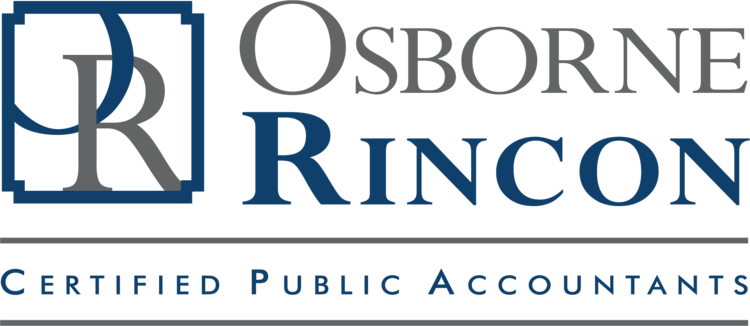By: Lori Siler, Senior Bookkeeper with Osborne Rincon CPAs
Good bookkeeping is essential for business owners, as it guides informed decisions about operations, investment opportunities and other financial options. Proper bookkeeping also gives banks, investors and the government the ability to determine the current and forecast the future financial health of the business.
In bookkeeping, financial transactions are recorded based on supporting documentation like a receipt, an invoice, a purchase order, a contract or some other type of financial record showing that the transaction took place. Transactions can be logged in by hand in a journal or by using a spreadsheet program like Microsoft Excel. Most businesses now use specialized computer software like QuickBooks Desktop or QuickBooks Online to keep records of their financial transactions.
Bookkeeping is an important, but preliminary, function in relation to the official accounting- of-record for the business. It collects the documentation for each financial transaction, records the transactions in the accounting journal, classifies each transaction as one or more debits and one or more credits, and organizes the transactions according to the chart of accounts.
Bookkeepers are financial professionals who document and record the financial transactions of a business. Depending on its size and staffing resources, a business can have an in-house bookkeeper, hire an independent contractor bookkeeper, or use a public accounting firm such as Osborne Rincon CPAs.
The Many Roles of a Good Bookkeeper
Tasks a bookkeeper regularly undertakes include reviewing accounts receivable, and accounts payable (money the company owes), determining available cash, reconciling bank statements, and tracking payroll data. They also often create detailed reports and notify business owners of any accounting errors they may find.
Bookkeepers often customize the chart of accounts based on the needs of the business. Some basic types of business accounts are:
· Cash (receipts and disbursements)
· Inventory (unsold products to be sold)
· Accounts receivable and payable (money owed to and by the business)
· Sales (revenue produced from selling products or services)
· Cost of Goods Sold (money spent on goods needed to operate)
· Retained earnings (profits reinvested back into the business)
Tracking income and expenses is necessary to file an accurate tax return. It is also essential to manage the successful growth and profitability of the business. When you have a good accounting system, it helps you make management decisions based on the numbers and facts.
Tips Regarding Potential Accounting Errors
There are several common accounting errors that you should watch for when reviewing your company’s books such as, recording deposits or payments twice, classifying a capital expenditure as a current expense, or failing to maintain accurate amortization schedules for fixed assets or loans. To avoid these and other errors and to optimize your financial reporting, here are some best practices when it comes to bookkeeping:
· Keep your personal and business bank accounts separate.
· Establish guidelines for the processing of accounts payable and accounts receivable.
· Optimize your chart of accounts.
· Embrace accounting software to track expenses, streamline your process, and increase efficiency.
· Ask your vendors to provide electronic documents so that they can be integrated into your accounting software.
· Continually review your work including validity and accuracy of invoices before paying them.
· Plan for taxes in advance.
Whether you opt for in-house or hire outside resources to do your bookkeeping, it is important to maintain a high level of accuracy in your recordkeeping and accounting tasks. Keeping an accurate financial record of your business starts with your bookkeeping practices.
Lori Siler graduated from the College of the Desert with a degree in HSAD, and after working in the addiction field for five years, she was drawn back into the accounting field. Lori brings with her 30 years of accounting management and bookkeeping experience. Lori has worked with diverse clients from independent contractors, law firms and major corporations to television products and real estate companies. Prior to moving to California 17 years ago, Lori lived most of her life in South Florida.
